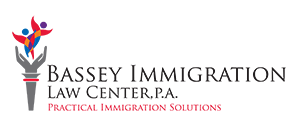Sponsoring a spouse or fiancé for a green card in Florida involves a multi-step immigration process through U.S. Citizenship and Immigration Services (USCIS). If sponsoring a spouse, the U.S. citizen or lawful permanent resident must file Form I-130 (Petition for Alien Relative). A fiancé requires Form I-129F (Petition for Alien Fiancé(e)) for a K-1 visa. Once approved, the spouse or fiancé can apply for adjustment of status (Form I-485) if already in the U.S. or go through consular processing if abroad. Both processes require proof of a bona fide relationship, financial sponsorship (Form I-864), medical exams, and an in-person interview.
At Bassey Immigration Law Center, we have over a decade of legal experience resolving many challenging immigration issues. Every member of our team has personal experience with the immigration process, so we understand the stress you are under and the importance of resolving this situation quickly and efficiently. Our multilingual team fully understands the immigrant experience and knows how to successfully fight for your future. Contact us today to schedule a consultation about sponsoring a spouse or a fiancé.
Petition Filing for Spouse
To sponsor your spouse, start by filing Form 1-130, Petition for Alien Relative, with U.S. Citizenship and Immigration Services (USCIS) to establish the relationship. Your spouse must complete and sign Form I-130A, Supplemental Information for Spouse Beneficiary. These forms must be filed together in your application.
You must show proof that your marriage is bona fide. In other words, it is a real marriage, not arranged for Green Card purposes. Such proof may include leases or mortgages in the names of both spouses, joint bank accounts, and notarized affidavits from family members and friends.
Petition Filing for Fiancé
If engaged to a U.S. citizen, a fiancé may marry in the U.S. if sponsored by their future spouse. The U.S. citizen must file a Form 1-129 F, Petition for Alien Fiancé. The filing of this form initiates the process for receiving a K-1 Nonimmigrant Visa for a Fiancé. If approved, the sponsored fiancé must enter the U.S. within six months, and the couple must marry within 90 days.
In addition, the U.S. citizen must have met their fiancé in person within the previous two years. Both the U.S. citizen sponsor and fiancé must be legally free to marry. To qualify, your fiancé must not be inadmissible to the U.S. due to criminal records, past immigration violations, or other legal disqualifications.
Adjustment of Status or Consular Processing
Spouses already in the U.S. must file Form I-485, the Application to Register Permanent Residence or Adjust Status. When approved under adjustment of status, the spouse does not need to return to their home country to obtain a Green Card.
If your spouse is outside the U.S. when their immigrant petition is approved, they must apply for an immigrant visa at a U.S. Department of State consulate. Once approved, they can enter the U.S. and receive permanent resident status.
Affidavit of Support
As a sponsor, you are required to file Form I-864, Affidavit of Support, under Section 213A of the Immigration and Nationality Act (INA). This form is a legally binding contract between the sponsor and the U.S. government, ensuring that the intending immigrant has adequate financial support and will not become dependent on public assistance. The sponsor must meet income requirements to prove financial ability to support the immigrant.
Schedule a Consultation with the Bassey Immigration Law Center
Bassey Immigration Law Center is a family-oriented law firm. We think families should be together. We will do everything we can to solve your immigration issues and meet your needs. Whether you want to reunite your family or obtain a green card through marriage, we can help. Attorney Aniefiok Bassey understands dreams and wants yours to be realized, too. Schedule a consultation today with a deportation lawyer. We look forward to hearing from you.
About Bassey Immigration Law Center, P.A.
Bassey Immigration Law Center, P.A., led by attorney Aniefiok Bassey, provides comprehensive immigration services to individuals, families, and businesses in Florida and beyond. With over 20 years of experience, the firm assists clients with a wide range of immigration matters, from family reunification and green cards to business visas and deportation defense. The diverse, multilingual team is dedicated to supporting clients through the complex immigration process, with a special focus on citizenship, asylum, and LGBTQ+ immigration needs. They offer affordable initial consultations and are committed to delivering personalized, strategic guidance for achieving clients’ immigration goals.
